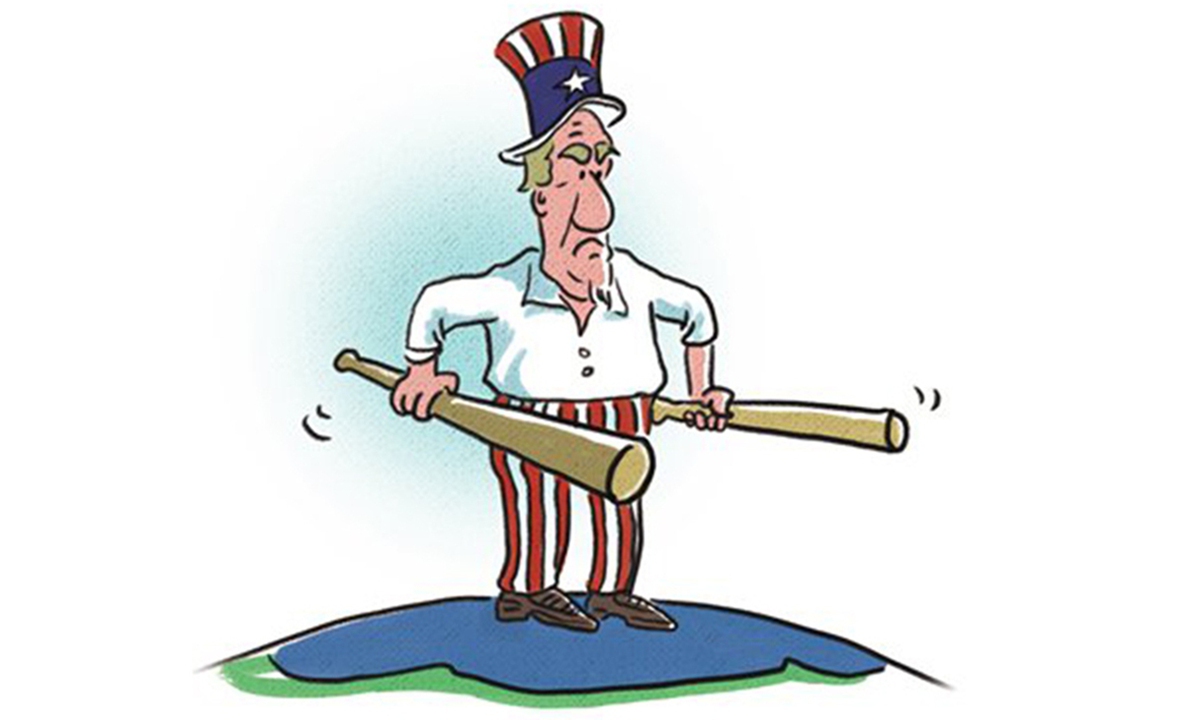
US hegemony Illustration: Liu Rui/GT
While accusing other countries of using their great power status to ensure obedience, the US is the actual instigator of coercive diplomacy, with a disgraceful "dark history" that has caused immense suffering for the world, particularly developing countries, which have borne the brunt of its actions. Even the US' allies and partners have not been spared from it, said a report released by China's Xinhua News Agency on Thursday.
Experts said the report was published just at the right time ahead of the G7 summit to reveal the US' treacherous purpose in concealing its own behavior of coercive diplomacy and economic coercion by sticking such labels on China.
Titled "America's Coercive Diplomacy and Its Harm," the report exposed the evil deeds of US coercive diplomacy in the world and allows the international community to better understand the hegemonic and bullying nature of US diplomacy, and the serious damage caused by US actions to the development of all countries, regional stability and world peace.
Today, coercive diplomacy is a standard instrument in the US foreign policy toolbox. From economic sanctions and technical blockades to political isolation and threat of force, the US has demonstrated what coercive diplomacy is to the world through its own actions.
Developing countries are the "worst-hit areas" of America's coercive diplomacy. For over half a century, countries including Cuba, Venezuela, North Korea, Iran, Belarus, Sudan, Russia, and China have all been subjected to coercive diplomacy by the US.
Violating the principle of fair trade and imposing tariffs on China, the tech blockade against China in the semiconductor sector, using state power to suppress China's high-tech enterprises… on China alone, the US has spared no efforts to bring about all-round suppression, even coercing its Western allies to side with it in targeting China.
Developing countries aren't its only victims. The US has shown no mercy in applying such coercive diplomacy on its allies. For example, in the 1980s when Japan's GDP reached half of the US', Washington forced Tokyo to sign the "Plaza Accord" which eventually led to the long-term stagnation of the Japanese economy.
In recent years, the US wielded the stick of tariffs at Europe and interfered in market competition. In 2018, the US government imposed tariffs on up to 25 percent and 10 percent on steel and aluminum products in regions including the EU. In January 2021, to improve Boeing's competitive advantage, the US announced tariffs of up to 15 percent on imports from France and Germany, including aircraft parts, involving a total value of $7.5 billion.
The report was published just in time ahead of The Group of Seven (G7) summit, where one important theme, under US dominance, is to stick the label of coercive diplomacy on China. This could help the international community see through the US' treacherous purpose in smearing China to cover its own behavior of coercive diplomacy and economic coercion, Li Haidong, a professor at the Institute of International Relations at the China Foreign Affairs University, told the Global Times on Thursday.
The G7 summit in Hiroshima will be held from Friday to Sunday.
According to media reports, G7 leaders will discuss concerns about China's so-called economic coercion in its dealings abroad as part of their larger joint statement.Li pointed out that to suppress China's development momentum for its own selfish gains, the US has continually created conflict and harmed prosperity in the Asia-Pacific region through economic and diplomatic coercion, as well as by wooing its allies. He added that what the US has done in the past 30 years across the world has clearly shown that it is the greatest source of danger and disruption to regional stability and order.
The US is the inventor and master of coercive diplomacy, said the report. As US scholars have pointed out, the essence of US coercive diplomacy lies in the idea that "you are either with us or against us. The US should lead, and its allies should follow, and countries that oppose the supremacy of the US will suffer."
China's diplomacy, in contrast, seeks to uphold the equality of all countries large and small, and never to divide the world into different groups or engage in the practice of coercion and bullying. To slander China for engaging in so-called coercive diplomacy is obviously just making trumped-up charges, the report concluded.




